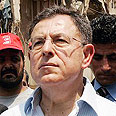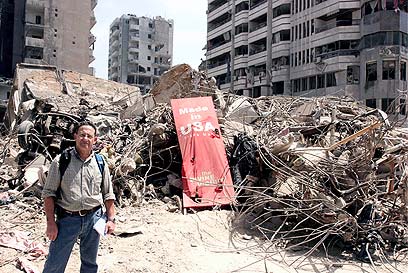
Israeli in Katyusha land
Yedioth Ahronoth correspondent visits southern Lebanon, among wreckage, burnt launchers and pits created after bombings. What would Lebanese soldier do when encountering armed Hizbullah fighter? What is organization's member doing in Bint Jbeil? Journalist Ron Ben-Yishai finds out
When we leave the city on our way east to Bint Jebil, the picture changes. The road is filled with burnt cars, destroyed petrol stations, demolished houses and many deep pits created by the bombings. This is where the battle between the Israel Air Force and the rocket launchers took place.
Residents we met told us that after the ceasefire Hizbullah rushed to remove and hide every damaged launcher, in a bid to provide credibility to its victory tale. But as I descend the road to the dirt tracks between the banana groves and the orchards covering the coastal area, we spot several damaged vans and trucks loaded with pipes, lying burnt in the forest clearings.
While driving through the endless groves and orchards, I realize that the Israel Defense Forces in fact had no chance to bring about a halt in the launching of Katyusha rockets through military operations. Among the tall banana tree and orchards were hundreds, if not thousands, of hiding places and hidden roads which could have been used by the rocket launching cells.
At least two divisions should have been brought into this area, east and south of Tyre, in order to reach any outcome. These groves provided Hizbullah with the same advantage that the Vietnam jungles provided to the Vietcong against the Americans.
Most of villages are empty
The road ascends east to the mountainous area. We are headed to Bint Jbeil, passing by the villages from where short-range Katyusha rockets were launched. They are all covered with indescribable destruction. Most of the villages are almost empty, only several residents are roaming around, burrowing through the wreckage.
I ask Salem the driver to deviate from the road and take me to the village of Yaatar. The force I joined as part of Operation Change of Direction 11 landed in helicopters near this village 48 hours before the ceasefire. I wanted to see in broad daylight the place where the Yasur chopper was shot down by an antitank missile.
The village was almost deserted. It was practically entirely ruined by the hundreds of artillery shells and bombing we heard whistling above us.

Ron Ben-Yishai in the field
From the houses on its southern end I saw the landing area which we reached by helicopters. Not far from there, lay several pieces of metal and a piece of the propeller from the chopper which was shot down.
Many small pieces of equipment and food remains were scattered among the bushes where we hid. It was astounding to see how exposed and how close we were to the village when we landed.
At the village of Atiri were encountered a Lebanese army roadblock. There was an entire company which set up an outpost near headquarters decorated with Hizbullah flags. The soldiers carelessly asked us where we were headed and allowed us to continue.
I asked to take a picture and they immediately consented. One of them even volunteered to take me to a house where Katyushas were hidden in the basement. The house was bombed and the Katyushas were scattered around it. I decided not to take the chance of stepping on a dud and went back.
"What would you do if you see a Hizbullah member approaching you carrying a Klashnikov?" I asked one of the soldiers. He smiled and said, "I'll tell him it's forbidden."
And if he fails to obey you? "I'll call my officer to tell him," was the answer. "Will you arrest him?" I asked. "Only if the officer gives me an order."
Hizbullah fighters have nearly stopped walking around with exposed weapons. Many of them returned to their civil jobs and began acting cautiously.
This is the great opportunity of the Lebanese government and its army: Despite their political and military weakness, I got the impression that they enjoy a lot of support and prestige even among Hizbullah members. The question is: Will Lebanese Prime Minister Fouad Siniora know how to take advantage of these assets in order to establish his status, or will Syria interfere again and disrupt plans.
Bint Jbeil: Only several houses still standing
The sign at the entrance to Bin Jbeil says in Arabic and English: "Bint Jbeil – the capital of freedom." Next to it is a monument or a statue of a collection of Katyushas directed at Israel.
Only several houses in the big town are still standing. We walk among the wreckage, looking for someone to talk to. At last a young woman in a country dress appears from nowhere. Her head and neck are covered with a kerchief and she is carrying a basket of vegetables.
Her name is Hadia and she shows us her house, which is leaning to the side. "I hid with the children in the basement for almost three weeks. It was hell," she says.
And where is your husband? "He, he used to come and go." To fight? I ask. She doesn’t answer, only smiles proudly.
The husband, about 30 years old, appears several minutes later. His face is covered with bristles and his head is shaved. I ask him to tell me about the battle which took place in the village. At first he hesitates, but eventually, after efforts to convince him, he is ready to admit that he took part in the fighting.
"We saw them (IDF soldiers) taking up posts here and here," he points to the ranges which overlook the town from east and south. "We knew they would eventually come down. We prepared an ambush near the jail behind those trees. They arrived in a very small force, maybe 20-30 soldiers. They walked right in front of us, and then we opened fire. We hit many of them and they began running like madmen, trying to drag the killed and injured. We continued to shoot at them until they were gone."
Where is your weapon? I ask. He ignores the question. And what will you and your wife do now? "It's not a problem," he says. "The mukawama (the resistance, i.e. Hizbullah) will give us money."
Do you think the Israelis will come back for revenge? He seems worried: "If they come, we will fight. But now enough. We have to stop all this. I want peace. Write that I want to return to work in the field and not fight anymore. I have a family which has to eat."
From Bin Jbeil the road or dirt track climbs up the steep slope to the village of Maroun al-Ras. The two communities are nearly adjacent, but while Bint Jbeil is spread out, Maroun al-Ras is set on the summit of the mountain.
This village, where the fighting began, is mostly destroyed. I rush to the eastern end of the village where a UNIFIL post is located, overlooking Israeli territory. I am amazed to discover how close the community of Avivim is, with its houses and streets are spread out under me. One can easily notice people walking in the community's alleys.
We return to the center of the village. Suddenly a female villager touches my shoulder, trying to tell me something. I call Rashid to translate. "Take me to Beirut," she says. "I've had enough of this cursed place."










